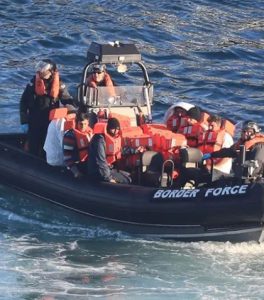English Channel arrivals are refugees – UN says
Most people arriving in the UK by small boats across the English Channel should be considered to be refugees, according to the UN refugee agency UNHCR.
The statement is a direct challenge to UK Home Secretary Priti Patel who told parliament last year that 70 per cent of people making the crossing were “single men who are effectively economic migrants”.
 A spokesperson for United Nations High Commissioner for Refugees Filippo Grandi told UKL media that people travelling by small boat to the UK should be considered to be asylum seekers or refugees, and not migrants.
A spokesperson for United Nations High Commissioner for Refugees Filippo Grandi told UKL media that people travelling by small boat to the UK should be considered to be asylum seekers or refugees, and not migrants.
The statement came as the UK’s controversial plan to process asylum seekers inn Rwanda was halted by the ruling by the European Court of Human Rights and a plan was revealed to electronically tag arriving asylum seekers.
The UNHCR said the UK government’s own data challenged claims that most people travelling to the UK by small boat were economic migrants.
“Based on currently available Home Office data, UNHCR considers that a clear majority of those recently arriving to the United Kingdom by boat are likely to be refugees,” a UNHCR spokesperson said.
“Refugees and asylum seekers are not, and should not be described as, ‘migrants’,” the spokesperson said.
“Access to asylum should never be contingent on mode of arrival or nationality. Equally, the only way to establish whether people are refugees is through a fair and efficient determination of their claims, for which the UK has a clear responsibility.”
Appearing before the House of Lords last November, Ms Patel was questioned about her new policy of deeming the asylum claim of any person who arrives in the UK after passing through a ‘safe’ country as ‘inadmissible’ – meaning their claim will not be considered.
“In the last year, 70 per cent of individuals on small boats are single men who are effectively economic migrants. They are not genuine asylum seekers,” she told the Lords.
A new analysis of the UK government’s latest data by The Guardian newspaper shows that 77 per cent of the men, women and children who come across the Channel in small boats are likely to be refugees and would accordingly be allowed to remain in the UK if their claims were assessed.
That figure, or grant rate, is calculated using recent government data showing boat from the top 20 countries of origin between January 2021 to March 2022, and a separate spreadsheet showing the numbers from each country over the same period who are given refugee status or other forms of protection and the number from each country who are refused.
The Guardian reported that data also showed that 1,094 Afghans arrived by small boat between January and March this year, after the fall of the Taliban last August.
That compares with 1,323 Afghans arriving across the Channel in the whole of 2021. The grant rate for Afghanistan between January 2021 and March 2022 was 88%.
More than 600 Syrians have arrived by small boat since January, official statistics show, compared with 776 in 2021. The grant rate for Syria between January 2021 and March 2022 was 99 per cent.
When the deal with Rwanda was announced on 14 April, Prime Minister Boris Johnson said it would see thousands of people being sent there to have their claims processed in the hope that it would discourage people smugglers operating across the English Channel.
More than 4,850 people have reached the UK in small boats since 14 April, more than two and a half times the number that crossed in the same period last year, and maintaining the same pace of increase seen since the beginning of the year.
Meanwhile, it has been revealed that some people who arrive in the UK in small boats or the back of trucks will be electronically tagged in a UK Home Office trial.
The department said the 12-month pilot, which began on Wednesday, will test whether electronic monitoring is an effective way to give immigration bail.
It is part of the Government’s crackdown on people using ‘unnecessary and dangerous routes’ to arrive in the country.
The Home Office hopes to break the business model of exploitative people smugglers who expose their passengers to dangerous conditions.
But activists say criminalising people based on their mode of arrival betrays the fundamental principle of asylum.












